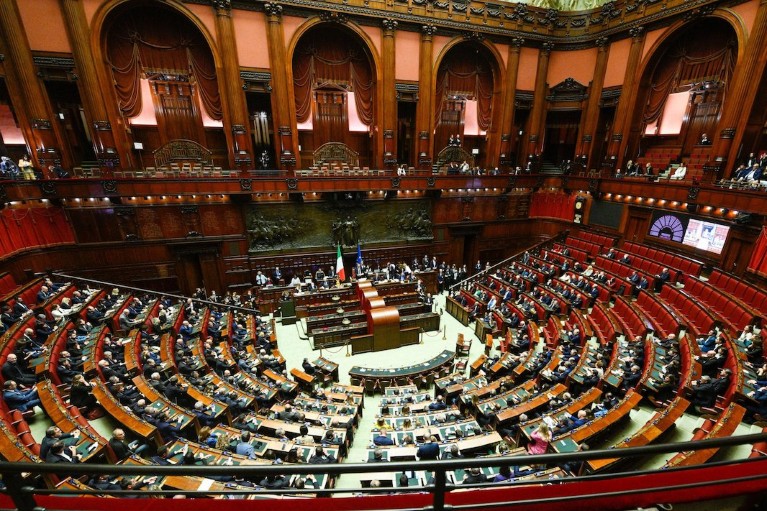
The inaugural session at the Italian Chamber of Deputies on October 13, 2022 in Rome. Credit: Live Media Publishing Group / Alamy Stock Photo.
The 2023 budget law for Italy put forward by the government was approved on 29 December, after winning a confidence vote in both houses of parliament.
The budget law adds €500 million for scholarships to university students in need of financial aid. For the period 2024-2025, the number of recipients will increase, and the average amount will increase by €700. This is in line with measures already taken under the National Recovery and Resilience Plan (PNRR), that cover 2022 and 2023. The university housing programme also received a boost of €300 million. Matteo Lorito, Rector of the University Federico II of Naples, says it is positive that research and university funding was not cut, but calls for a structural intervention to increase the number of university graduates, that is still among the lowest in Europe. “The PNRR gave us a boost, but it will take time to reach the European average,” he says.
The financial bill allocates €15 million to the National Research Council (CNR), Italy’s main research body, to complete the reorganization that began a year ago and that was funded by the previous government with €60 million to be spent between 2022 and 2024. Vito Mocella, a CNR physicist and former member of its board of directors, welcomes the increment, but says implementing reform has no clear timeframe or strategic vision. “The intentions are good but structural changes are still far away,” he says. “The distance between governance and the base of researchers is still wide, bureaucracy is asphyxiating, and careers are stagnating”. The CNR offered no comment.
The budget law appoints a commissioner for a new health, research and innovation park in Turin, set up through a €455 million public-private partnership. The appointment is accompanied by additional funds for the project of €100.000 for each year 2023, 2024 and 2025. Giovanni La Valle, general director of the Città della Salute of Torino, who leads the project, says the commissioner will be instrumental to overcome bureaucratic obstacles.
Finally, the bill budgets for a new centre for the design of semiconductor integrated circuits, funded with €10 million in 2023 and €25 million per year from 2024 to 2030. The aim is to create a network of universities, research centres and companies to promote innovation and technology transfer. The centre will be under the umbrella of the three ministries for economy and finance (which will supervise it), of enterprise, of university and research.
The bill does not cover the main source of funding for universities, the so-called ordinary fund (FFO). A year ago, the previous government had decided a gradual increase of the FFO, compared to 2021 level, by €252 million for 2022, €515 million for 2023, €765 million for 2024, €815 million for 2025 and €865 million annually starting from 2026. These increases remain in effect. Rosa Fioravante, general secretary of the ADI association of PhD students and young researchers, says her association had asked the government to add new funds to better finance the career reform approved last summer, that increases researchers’ salaries —so could reduce the number of hires unless universities are given more resources.However, the career reform has been put on hold for a year.
